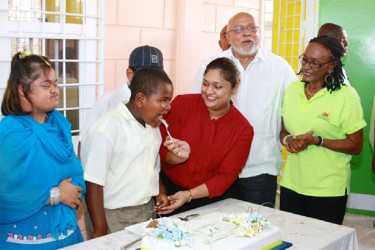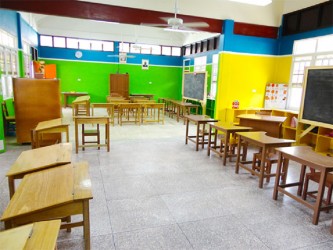The $50 million Harold B Davis Special School was yesterday commissioned at the Ptolemy Reid Rehabil-itation Centre (PRRC) during a simple ceremony, at which Rehabilitation Offi-cer Cynthia Massay announced that the name was chosen to honour former chairman, Harold B Davis, who was the longest serving chairman of the school board.
PRRC Chairman Cornell Randy Storm recalled that Davis, who was chairman for 18 years, continued to serve as an ordinary member of the board until his death.
The centre also celebrated its 47th anniversary yesterday.

Minister of Finance Dr Ashni Singh said government has invested $50 million in the new school building for the PRRC. This investment, he said, is a good choice since he believes that every Guyanese should be given the opportunity to realize their true potential.
He said PRRC receives finances from the government as well as non-governmental organisations such as the Rotary Clubs of Guyana and added that the ministry will continue to work with the NGOs to ensure that the PRRC is a world class learning facility.
Addressing the gathering, Head Master of PRRC Anand Mangru noted that the centre was established by the Ministry of Health in January 1967. Initially it was for children suffering from residual paralysis as a result of the polio virus. He said the nursing staff later approached the Ministry of Education and started a school for the differently abled with one class and one teacher.
He added that after the eradication of polio the school was expanded to three classrooms and three teachers and it was called the Special Education Unit.
He said the classes which were called Nursery, Preparatory and Primary and are now called levels One, Two and Three and the school currently has ten teachers and two aides with 65 children enrolled.
“Former president Bharrat Jagdeo has always been a friend of the centre and during his final year in office, he visited the centre and decided to take the step to initiate a school building at ground floor level when he saw the cramped situation in classrooms and the ramps children used to get to class,” Mangru said.

He added that the ministries of Finance and Education brought the ground floor building to a reality. Mangru said that in July 2011, the entire Management Team of the PRRC visited special needs schools in Suriname and took pictures and videos. These were related to the architect and thus, the state-of-the-art building for effective learning was constructed.
He thanked everyone in Suriname who hosted PRRC members during their visit.
At present, PRRC accommodates both residents and non-residents and teach subjects such as Mathematics, Science, Social-Studies, Informa-tion Technology, Arts and Craft, Agricultural Scie-nce, Music and Movement, Mangru said while adding that PRRC also offers extracurricular activities such as hydrotherapy (swimming) and horseback riding.
Minister of Education, Priya Manickchand said she believes the character of a people can be measured by the way they treat their most vulnerable. She added that schools and schooling throughout Guyana have changed over the years.
“We see reports of child abuse now and three to five years ago, there were no reports made, we had no place for these reports,” Manickchand stated while adding that government understands what it needs to do to help the vulnerable population.
She further stated that the government implemented aggressive vaccination to prevent the polio virus which is the sole reason why Guyanese population no longer suffers from polio.
She underscored that special needs education is priority for the Ministry of Education and special education and treatment for special needs children are currently the best Guyana has ever seen.
President Donald Ramotar said that 30% of Guyana’s annual budget goes to the education sector (social sector). This, he said, is to help improve equality in our society.
He further stated that education can move a nation forward and added that most of the developed countries are where they are because of the educational level of the population and not necessarily because they have a lot of natural resources.





